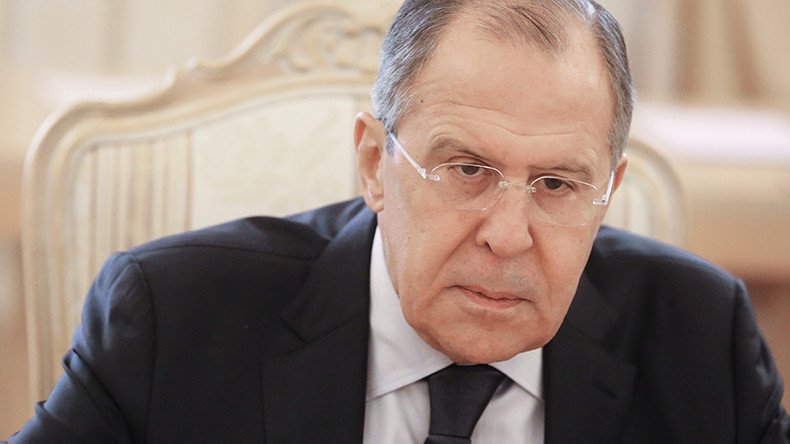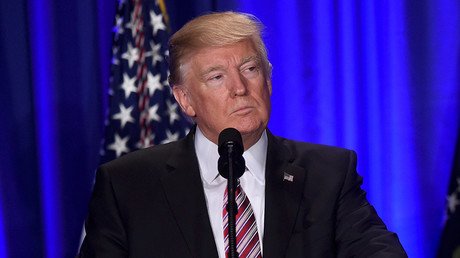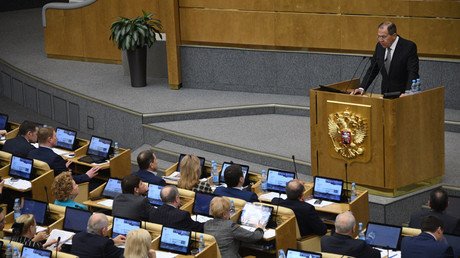Lavrov: Undoing Obama-inflicted damage to Russia-US ties will take great effort

Serious efforts are required to overcome the severe damage done to US-Russia relations under Barack Obama, Russian Foreign Minister Sergey Lavrov told Austrian magazine Profil, adding that the need for dialogue, voiced by Donald Trump, gives hope for improving ties.
“Of course, we kept close tabs on what Donald Tramp said about Russia on the campaign trail and after the elections. The stated stance of the need to build a good dialogue between the two countries gives some hope for positive developments in our bilateral relations,” Lavrov said in an interview with Austrian weekly news magazine Profil.
“As President Putin repeatedly stressed, we are ready to go our part of the way for the recovery of our relations with the United States. Their degradation in recent years is not our fault but a result of purposeful actions of the previous administration in Washington. For our part, we have always stayed open to development of predictable cooperation, based on the principles of equality, mutual respect and consideration of each other's interests.”
Improving bilateral ties could prove to be a real challenge, Lavrov said.
“We realize that serious efforts from both sides are required to overcome the severe damage done to our relations under Barack Obama. It’s probably still too early to talk about how work on specific issues will go with the [new] Republican team. It is necessary to wait until the key officials of the new administration feel comfortable in their seats and clarify their foreign policy priorities. After that it will be possible to draw conclusions for the future.”
In their first phone conversation that lasted nearly an hour late last month, Russian President Vladimir Putin and new US President Donald Trump outlined their intent to cooperate on issues ranging from defeating Islamic State to mending bilateral economic ties.
“Both sides expressed their readiness to make active joint efforts to stabilize and develop Russia-US cooperation on a constructive, equitable and mutually beneficial basis,” as well as “build up partner cooperation” on a wide range of international issues, according to a Kremlin statement following their discussion.
The White House also acknowledged that the “positive” conversation was “a significant start to improving the relationship between the United States and Russia that is in need of repair.”
“Both President Trump and President Putin are hopeful that after today’s call the two sides can move quickly to tackle terrorism and other important issues of mutual concern,” the official US statement added.
Lavrov said Moscow and Washington can jointly attempt to resolve some of world’s most pressing issues.
“We are convinced that wherever there is mutual interest, Russia and the United States can definitely move forward in resolving bilateral issues and make a joint contribution to the effective resolution of the key problems of today. Especially in demand is the [joint] coordination of our countries’ efforts in the fight against international terrorism.”
“On top of it, we have a big untapped potential of mutually beneficial cooperation in trade, investment, innovation and technological spheres. It’s a good sign that despite the sanctions and pressure from the Obama administration, the majority of US companies did not want to leave the promising Russian market. It has proved to be very profitable for them. We’re also interested in expanding cultural and humanitarian exchanges.”
“I repeat: it is possible to establish effective cooperation between Russia and the United States, but only on the basis of mutual respect and interests,” the top Russian diplomat said.
When asked under what conditions Russia could lift its sanctions against the EU, Lavrov replied: “This question should not be addressed to me. We didn’t initiate the sanctions, it’s not up to us to lift them,” the Russian FM said.
“We have imposed [our] sanctions as a countermeasure for one simple reason. European sanctions restrict the ability of our banks to receive loans for the financing of agriculture, which would mean that the EU farmers would benefit from conditions of unfair competition on the Russian market. We had to do everything possible to stay honest. That's all.”
Speaking of Austria’s upcoming presidency at the OSCE, Lavrov expressed hope that it will primarily help in settling the Ukrainian crisis.
Speaking of Syria, Lavrov described the negotiations that took place on January 23–24 in Kazakhstan’s Astana as “an important and a whole new step in the peace-making progress.”
“We managed to strengthen the ceasefire regime introduced in Syria under the December 29 agreement… At the same time, we do not plan to replace the Geneva talks with those in Astana,” Lavrov said, adding that “Astana has given an additional momentum to the Geneva process.”















